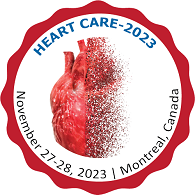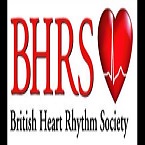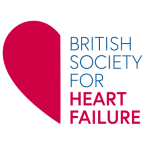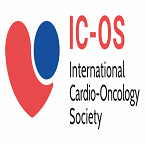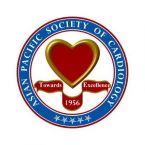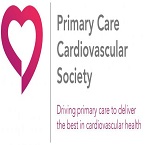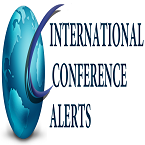Renowned Speakers
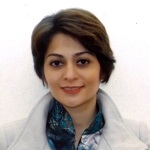
Prof Dr. Sonia Sayyedalhosseini
Faculty Member in California Northstate University. USA
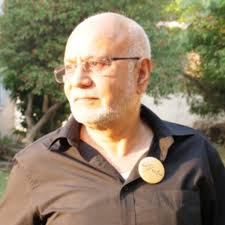
Suresh Vatsyayann
Family Medicine Specialist , FRNZCGP Waikato University. Newzealand

Hiroki Kajihara
Hiroshima Prefictural Medical Association. Japan

Galya Atanasova
Professor - Medical University Pleven . Bulgaria

Daniel Lichtenstein
Ambroise-Paré Hospital. France
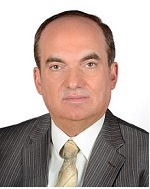
Dr. Samer Ellahham
Dr Chief Quality Officer, Sheikh Khalifa Medical City. UAE

Sergey Suchkov
Director, Center for Personalized Medicine Sechenov University, Russia Russia

Rainer Moosdorf
University Hospital of Giessen and Marburg. Germany
Recommended Global Cardiology Webinars & Conferences
Asia Pacific & Middle East
Heart Care-2023
About conference
31st World Heartcare Summit which will be held on November 27-28, 2023 Montreal, Canada
HEART CARE-2023 contributes opportunities (WHS-2023) to Scientists, research scholars, students, (WHS-2023) delegates, and exhibitors to enhance their skills and improve quality of research. We welcome you to go along with us at HEART CARE-2023, (WHS-2023) where you will make certain to have an important involvement with both your colleagues and experts from around the globe. It helps you to implement practical, proven strategies to run your research more effectively, efficiently, and profitably.
The conference (WHS-2023) is going to be organized on the (WHS-2023) Theme: "Exploring new innovative therapies for Healthier Heart". Goes to be the most important and most promising international conference that specifically focuses on the Internet by bringing all (WHS-2023) renowned researchers under one roof. This is often a 2-day multidisciplinary meeting covering all aspects of novel research and contributions within the field of Heart Care.
• Commendable talks by the first-string of the worldwide scientific community.
• Sterling workshop sessions.
• Global (WHS-2023) Recognition to meritorious Researchers.
• Global Networking with 50+ Countries.
• Novel Techniques to profit Your Research.
• Global Business (WHS-2023) and Networking Opportunities.
• Exquisite platform for exhibiting your by-products and International Sponsorship
Young Scientist Benefits
Our conferences (WHS-2023) provide best Platform for your research through oral presentations.
Share the ideas with both eminent researchers and mentors.
Young Scientist will get (WHS-2023) International Certificate.
Platform for collaboration among young researchers for better development
Cardiologist| Cardiac Surgeon (Cardiothoracic Surgeon)| Clinical Nurse Specialist in Cardiology| Electro physiologist| Cardiovascular Technologist| Medical Sonographer| Dialysis Technician| Nephrologist Technician| invasive cardiologist| interventional cardiologist| transplant cardiologist| paediatric cardiologist| imaging cardiologist| heart failure cardiologist |neurologist |invasive cardiologist| non-invasive cardiologist| interventional cardiologist.
Why to attend?
Attend Heartcare conference (WHS-2023) focus on creating an international platform for the participants to share their knowledge and research work on the respective fields. It will include various tracks and sub-tracks (WSBT-2023) within attend Heartcare field, which will further allow the participants to choose their respective tracks of their interests. The conference (WHS-2023) will give an opportunity to explore the topic with highly qualified researchers, scientists, Business persons, professors and related people and associations who are involved in this field. It will be a great opportunity for the (WHS-2023) young researchers as well to learn and explore about their respective fields in attend Heart care.
Sessions & Tracks
Track 1: Atrial Fibrillation
Atrial fibrillation (A-fib) is an irregular and often very rapid heart rhythm (arrhythmia) that can lead to blood clots in the heart. A-fib increases the risk of stroke, heart failure and other heart-related complications. The exact cause of atrial fibrillation is unknown, but it's more common with age and affects certain groups of people more than others. Atrial fibrillation is common in people with other heart conditions, such as: high blood pressure (hypertension) atherosclerosis. When a person has A-Fib, the normal beating in the upper chambers of the heart (the two atria) is irregular, and blood doesn't flow as well as it should from the atria to the lower chambers of the heart (the two ventricles). A-Fib may happen in brief episodes, or it may be a permanent condition.
Track 2: Device Therapy
Cardiac resynchronization therapy (CRT) is treatment that helps your heart beat in the correct rhythm. Use a pacemaker to restore a normal heartbeat pattern. A CRT pacemaker coordinates the timing of the upper chambers (atria) and lower chambers (ventriculum) of the heart. ICD may reduce the risk of sudden death in some people with heart failure. The ICD can fix a heart rate that is too fast or too slow without using a shock. Cardiac rehabilitation can begin while you are in the hospital or right after you leave the hospital. Cardiac rehabilitation programs typically last about 3 months, but range from 2 to 8 months.
Track 3: Heart surgery
Cardiac surgery or cardiovascular surgery is surgery on the heart or large blood vessels performed by cardiac surgeons. Heart bypass surgery is serious but relatively safe. Surgeons perform hundreds of thousands of heart bypass surgeries each year, and many people who do get relief without long-term medication.The more severe the heart disease, higher the risk of the complications. Open heart surgery usually takes 3 to 5 hours. During the procedure, the doctor makes an incision about 7 to 8 inches long in the middle of the breastbone. After you are discharged from the hospital, it usually takes 6 to 8 weeks for your breastbone and chest muscles to heal as you gradually return to your normal routine.
Track 4: Cardiac Nutrition
"Heart diet" is the informal term for a heart-healthy diet. A meal plan emphasizes foods that promote heart health, such as vegetables and fruits rich in omega-3 fatty acids, whole grains, lean meats, and oily fish such as salmon and tuna. A heart diet prioritizes foods like vegetables, whole grains, and oily fish. These foods are good for heart health. The diet also limits processed foods high in sugar and salt. This is because these foods may increase your risk of heart disease. One way to start is to create a daily meal plan that emphasizes vegetables, fruits, and whole grains, and limits high-fat foods (such as red meat, cheese, and baked goods) and high-sodium foods (such as canned or processed foods).
Track 5: Coronary Artery Disease
Cholesterol deposits or plaques are almost always to blame. This accumulation narrows the arteries and reduces blood flow to the heart. This can cause chest pain, shortness of breath, or heart failure. Coronary artery disease (CAD) can be treated, but there is no cure. This means that if you are diagnosed with CAD, you will have to learn to live with it for the rest of your life. By lowering your risk factors and eliminating your fears, you can live a full life despite your CAD. Atherosclerosis is believed to progress over many years, but it is increasingly noted that it progresses over several months to 2-3 years in a small number of patients without traditional factors for accelerated atherosclerosis. Therefore, the term rapid progression of atherosclerosis has been used in recent years.
Track 6: Acute Coronary Syndromes
Acute coronary syndrome is a term used to describe a variety of conditions involving a sudden and reduced blood flow to the heart. One such condition is a heart attack (myocardial infarction). This is when cardiac tissue is damaged or destroyed due to cell death. Acute coronary syndrome refers to a group of disorders in which blood flow to the heart is reduced. Some examples are ST elevation myocardial infarction, non-ST elevation myocardial infarction, and unstable angina. Acute coronary syndrome is usually caused by the build-up of fatty deposits (plaque) in the walls of the coronary arteries, the blood vessels that supply oxygen and nutrients to the heart muscle. When plaque deposits rupture or crack, clots form.
Track 7: Acute Cardiac Care
Acute Cardiac care refers to a level of care where the patient requires immediate but brief treatment. This treatment may be in response to a serious episode, especially one involving chronic illness, trauma, or while recovering from surgery. Acute is considered short term. It is the opposite of chronic or long-term treatment. The Acute Cardiac Units are nine wards that treat adult patients with a variety of acute heart conditions. These conditions include heart failure heart failure, and heart rhythm problems. People who are transferred to long-term acute care hospitals spend an average of 25 days or more. The length of your stay is determined by how well you are doing and how much progress you have made during your stay. When you are ready to leave the hospital, your case manager at LTAC Hospital will let you know.
Track 8: Valvular Heart Disease
Heart valve disease is when the valves in the heart are damaged or diseased. Valve disease has many causes. A normal heart has four chambers (right and left atrium, right ventricle and left ventricle) and four valves. Aortic stenosis (AS), organic and ischemic (functional) mitral regurgitation, and tricuspid regurgitation are the most common valve disorders in the elderly. Drugs are not a cure for heart valve disease, but treatment can often relieve symptoms. Even if you have no symptoms, you may eventually need heart valve surgery to repair or replace a diseased heart valve. If another heart condition requires surgery, the doctor can repair or replace the diseased valve at the same time.
Track 9: Myocardial Disease
Infection causes inflammation of the heart muscle (myocarditis). Infections are often caused by viruses. This is one of the most commonly found causes of DCM. Many other cases are likely to be inherited. Primary myocardial diseases include dilated or infiltrative cardiomyopathy ischemia, myocardial infarction, myocardial degeneration and necrosis (eventually leading to fibrosis), bacterial or viral myocarditis, neoplasia, and trauma. The cause of dilated cardiomyopathy is unknown. Electrocardiogram (EKG or ECG): An EKG records the electrical activity of the heart and shows how fast the heart beats and whether the rhythm is regular or irregular.An EKG can detect cardiomyopathy, as well as other problems, including heart attacks, arrhythmias (abnormal heart rhythms), and heart failure.
Track 10: Pulmonary Circulation
The pulmonary circulation is a transport system that diverts deoxygenated blood from the heart to the lungs to be resaturated with oxygen before being distributed to the systemic circulation. The pulmonary circulation carries oxygen-poor blood from the right ventricle to the lungs, where it receives a new blood supply. It then returns oxygen-rich blood to the left atrium. The pulmonary circulation includes the pulmonary artery (also called the "right ventricular outflow duct"), left and right major pulmonary arteries and their lobe branches, intrapulmonary arteries, large elastic arteries, small muscular arteries, arterioles, capillaries, veins, and large arteries. The lymphatic system plays an important role in maintaining dry alveolar membranes and preventing the accumulation of tissue fluid around the pulmonary circulation.
Track 11: Heart Arrhythmias
Acardiac arrhythmia (uh-RITH-me-uh) is an irregular heartbeat. Heart rhythm problems (cardiac arrhythmias) occur when the electrical signals that control the heart beat don't work properly. Faulty signals cause the heart to beat too fast (tachycardia) or too slow (bradycardia) or irregularly. Atrial Fibrillation (AF) – This is the most common type, in which the heart is irregular and beats faster than normal. Bradycardia – when the heart beats more slowly than normal. Narrowed heart arteries, heart attack, abnormal heart valves, previous heart surgery, heart failure, cardiomyopathy, and other heart damage are risk factors for almost all types of arrhythmias.
Track 12: Heart Failure
Heart failure occurs when the heart muscle cannot pump blood properly. Blood often backflows, causing fluid to pool in the lungs (congestion) and legs. Fluid build-up can cause shortness of breath and swelling of the legs and feet. Poor blood flow can make the skin appear blue (cyanosis). Most people with end-stage heart failure have a life expectancy of less than 1 year. 4. The main causes of heart failure are diseases that damage the heart, such as heart disease, high blood pressure, and diabetes. The most common conditions that can lead to heart failure are coronary artery disease, high blood pressure, and a previous heart attack. If you've been diagnosed with one of these conditions, it's important to manage it carefully to prevent developing heart failure.
Track 13: Heart Valve Disease
In heart valve disease, one or more of the heart's valves do not work properly. The heart has four valves that keep blood flowing in the right direction. In some cases, one or more valves do not open or close properly.This can interfere with blood flow through the heart to the body. Any valve in the heart can be affected, but the aortic valve is most commonly affected. Another common type of heart valve condition occurs when the opening of the valve becomes narrow and stiff, preventing the valve from fully opening when blood is trying to pass through it. This is called stenosis. Most heart valve conditions are treatable. Medicines can treat symptoms or prevent the condition from getting worse. Your doctor may also suggest surgery or other procedures to repair or replace a defective heart valve.
Track 14: Pericardial Disease
Pericardial disease can present clinically as acute pericarditis, pericardial effusion, cardiac tamponed, and constrictive pericarditis. Later, the patient may develop chronic or recurrent pericarditis. Pericardial effusion may result from inflammation of the pericardium (pericarditis) after disease or injury. In some circumstances, certain cancers can cause large amounts of exudate. Blockage of pericardial fluid or pooling of blood within the pericardium can also cause this condition. Depending on the severity of the accumulation, pericardial effusion can be treated with medication. If the medical team determines that excess fluid needs to be drained, they may recommend a procedure called pericardiocentesis, which uses a needle and a small catheter to drain the fluid. Pericarditis pain can usually be treated with over-the-counter pain relievers such as aspirin or ibuprofen (Advil, Motrin IB, etc.). Prescription strength pain relievers are also available.
Track 15: Cardiac nursing
Cardiac Nursing is a nursing specialty that works with patients suffering from various conditions of the cardiovascular system. Cardiac nurses help treat conditions such as unstable angina, cardiomyopathy, coronary artery disease, congestive heart failure, myocardial infarction, and cardiac arrhythmias under the direction of a cardiologist. Cardiac care nurses provide postoperative care to patients recovering from cardiac surgery, as well as on-going care to help manage a patient's heart condition, such as administering medications and performing health assessments.
Market Analysis
The global heart supplements market has witnessed significant growth in the historical period registering a CAGR of 3.81% in the historical period and is valued at US$ 10,765.80 million in 2023.
The global heart supplements market derives profits from the easing consumer awareness regarding preventative healthcare. The higher availability of novel products that aid specific requirements and needs while being easily accessible are among the considerable factors responsible for the rising growth of the heart health supplements market.
The steady prevalence of heart diseases owing to the sedentary lifestyle and eating habits along with increasing concerns about obesity have provided impetus towards the rising sales of heart health supplements. Furthermore, acquisitions, mergers and joint ventures by prominent players in the dietary supplements market landscape have strengthened the market positions of key manufactures of the heart health supplements.
The global market for heart health supplements is estimates to reach an approximate valuation of US$ 16,718.95 Million in the forecast period.
Abstract Submission Criteria And Eligibility
Abstract Submission Criteria and Eligibility
PRESENTATION REQUIREMENTS:
Participating authors are answerable for registration, travel, and hotel costs. Note: Those with submitted abstracts will get an acknowledgment mail enabling them to enroll for the gathering.
Abstracts will be compiled, and conference books are made available to participants at the conference.
Any presenter who is unable to attend should arrange for another qualified individual to present the paper/poster in question. If such a change is necessary, please notify our conference team.
SUBMISSION OPTIONS:
Oral paper introductions will have 30-minute schedule time slot. The keynote session will have for 45-minute presentation duration, workshop/special session will have 1-hour long schedule opening and symposium will have 1-hour long availability followed by 5-minute Q&A session.
Graduate and master’s understudies are qualified to present their abstracts under poster and e-poster presentation category.
Ph.D. understudies are qualified to submit their abstract under special YRF (Young Researcher's Forum), poster and e-poster presentation category.
NOTE: YRF category includes short oral presentation especially for Ph. D. students
Extended abstract: Submissions should utilize the Abstract Template. Papers submitted in this category may represent original empirical research, theoretical development, reviews, or critiques.
Participation Options and Benefits
PARTICIPATION OPTIONS: Heart care Summit Conference provides the participants with different modes or ways to participate such as Delegate or Speaker under either ACADEMIC / STUDENT / BUSINESS Category. Mode of participation is Online through Power Point Presentation/ Video Presentation on Cisco Webinars.
1. Keynote speaker: 45-50 minutes
2. Speaker (oral presentation): 25-30 minutes (only one person can present)
3. Speaker (workshop): 45-50 minutes (more than 1 can present)
4. Speaker (special session): 45-50 minutes (more than 1 can present)
5. Speaker (symposium): more than 45 minutes (more than 1 can present)
6. Delegate (only registration): will have access to all the sessions with all the benefits of registration
7. Poster presenter: can present a poster and enjoy the benefits of delegate
8. Remote attendance: can participate via video presentation or e-poster presentation
9. Exhibitor: can exhibit his/her company’s products by booking exhibitor booths of different sizes
10. Media partner
11. Sponsor
12. Collaborator
Benefits of Joining Conference:
Get your abstract published with DOI
Get Certified for your participation
Reduced Costs Affordability
Knock Down Geographical Barriers
Convenience from comfort of your own home or from work
They’re Archived: Ability to view events in the recording
Great resource for learning new career skills
Learn from the Pros
Global exposure to your research
Make new connections
Significant time saving
Increased engagement
More Engaging
Position yourself as the expert
Get your abstracts published with unique DOI in International Journals
Get up to 50% discounts for publishing your entire article in our open access International Journals
Get Handbooks and conference kits
Get an access to the network with eminent personalities from worldwide.
To Collaborate Scientific Professionals around the World
Conference Date November 27-28, 2023
For Sponsors & Exhibitors
Speaker Opportunity
Useful Links
Past Conference Report
Supported By
All accepted abstracts will be published in respective Conference Series International Journals.
Abstracts will be provided with Digital Object Identifier by
